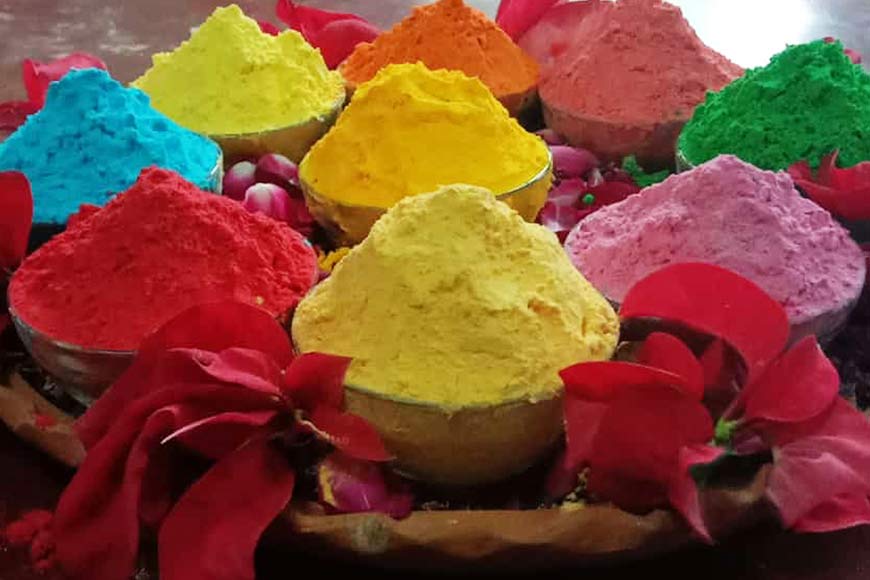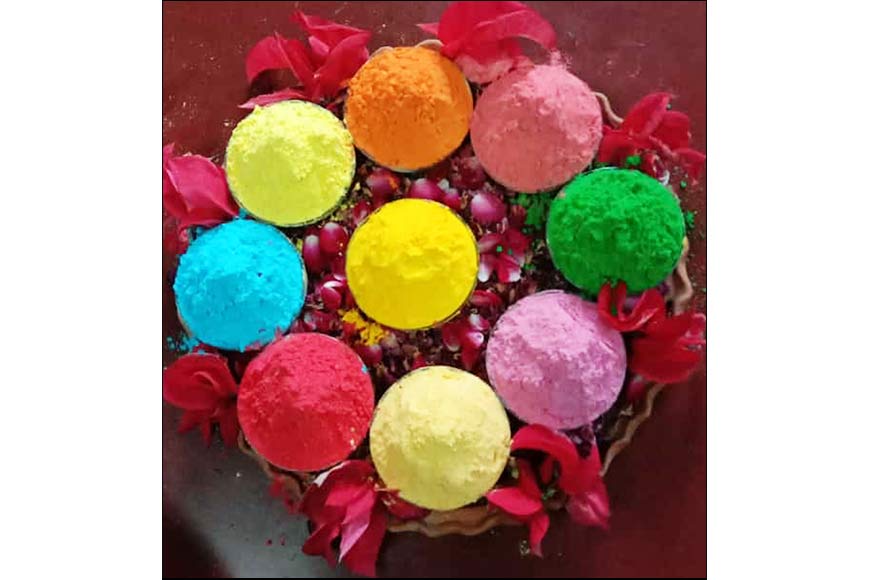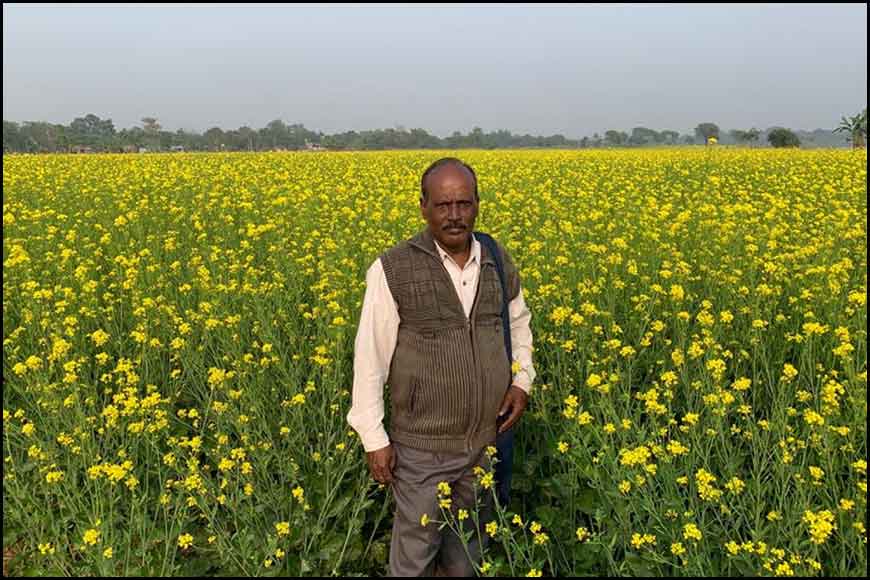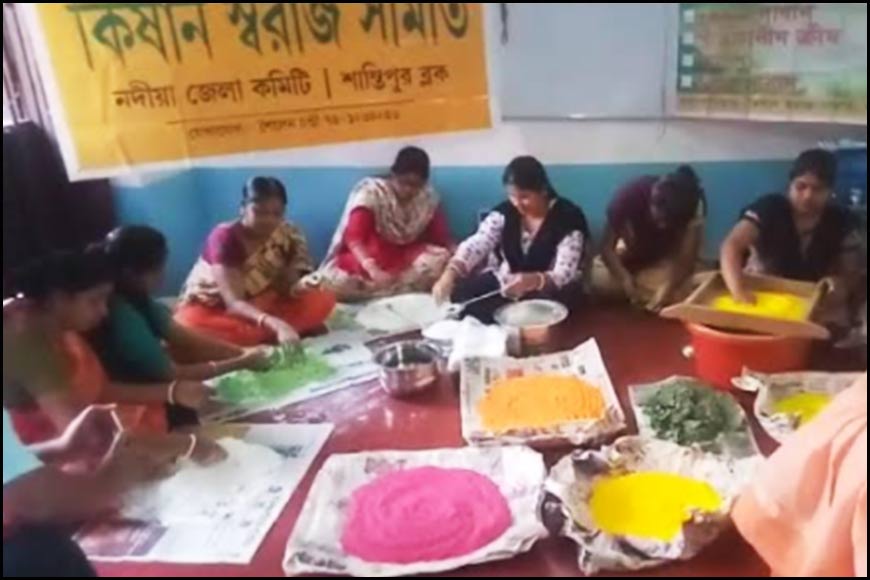Herbal Abeer makers of Shantipur

“Of all God’s gifts to the sighted man, color is holiest, the most divine, the most solemn.” – John Ruskin
The Festival of colours is round the corner and though many of us will probably remain indoors and not play with colours, thanks to the Pandemic raging, yet Holi and Bengal’s Dol Utsav will always usher in the colours of Spring. Traditionally, Holi or Dol Purnima celebrates love and equality and the origin of this festival is based on a legend that narrates Lord Krishna complaining to his mother Yshoda, about the darkness of his skin compared to that of his consort Radha. To pacify him, Yashoda smears colours onto Radha’s face. Since then Holi became the great leveler that aims to erase inequality or segregation based on skin colour. It is a festival that heralds love and equality.
Department of Agriculture, Government of West Bengal initiated a plan for setting up seed villages in the state. NABARD recommended his name and Sailen Babu completed the project successfully within the stipulated time. By now he was fully into propagating low cost, high-yielding organic farming. But where was the market to sell the produce? The answer was the birth of ‘Bish-mukta Khaddya Bazar’ (poison-free organic produce market) at Shantipur.
 Organic Abeer
Organic Abeer
There was a time, when ‘abeer’ was prepared from flowers of trees like Indian Coral Tree and Flame of the Forest, that had medicinal properties too beneficial to the skin. Unfortunately, after advent of synthetic dyes around middle of 19th century and with disappearance of trees from the urban landscape, natural colours lost to the chemical ones. Recently, the various harmful effects and concerns for the environment (synthetic powders caused temporary wastewater pollution, too) generated awareness and encouraged people again to celebrate Eco-friendly Dol. This year, we can hope to get access to ‘Twak Bandhav’ (skin-friendly) herbal abeer prepared by women of Santipur and nearby villages of Nadia district under the aegis of Sailen Chandi, Secretary of Kishan Swaraj Samity, Shantipur Block and secretary, Shantipur Farmers’ Welfare Society.
SPRING SATURDAY (27th March 2021)
Daga Nikunj 25/1 Ballygunge Circular Road, Kolkata 700019
Time: 8 AM to 12 Noon
Contact: 8585840725
Mr Chandi, a veteran member of Kissan Swaraj Samity, a national-level farmers’ organization, was approached by National Bank for Agriculture and Rural Development (NABARD) officials in 2010 to form farmers’ clubs in his districts, Nadia, and gradually expand its function and bring other farmers into its fold. This was a time when Mr Chandi was working on creating seed banks with indigenous seeds and reach quality seeds and other inputs to reach all farmers, even the marginal ones, at an affordable cost. A seed bank is a place where seeds are stored to preserve genetic diversity for the future and ensure our future is as ecologically rich as today.
 Sailen Chandi
Sailen Chandi
Mr Chandi, a veteran member of Kissan Swaraj Samity, a national-level farmers’ organization, was approached by National Bank for Agriculture and Rural Development (NABARD) officials in 2010 to form farmers’ clubs in his districts, Nadia, and gradually expand its function and bring other farmers into its fold. This was a time when Mr Chandi was working on creating seed banks with indigenous seeds and reach quality seeds and other inputs to reach all farmers, even the marginal ones, at an affordable cost. A seed bank is a place where seeds are stored to preserve genetic diversity for the future and ensure our future is as ecologically rich as today.
Also read : Organic Paddy Seeds of Bengal across India
NABARD officials were impressed with Mr Chandi’s vision and suggested him to take a short professional course offered by the Ramakrishna Mission Vivekananda Educational and Research Institute, Belur. Mr Chandi decided to give it a try. “Initially, when I joined the six-day course, I was truly not prepared for what awaited me. The first two days were very monotonous and seemed to drag on. I would curse myself for getting into this boring training. But from the third day, I started enjoying the lectures and the demo classes. After classes, we would have an informal discussion session with the Maharajs (monks) every day and this was an eye-opener for me and broadened my perspective manifold. It was a moment of reckoning for me and I wanted to do something for the society. Later, I took five more similar short-term courses on cultivation and other aspects of agriculture from the same organization,” Mr Chandi beamed as he recollected his experience.
Sailen Babu to venture into virgin territory and increase his sphere of activity. For decades he had been witness to the various government and NGO-sponsored programmes for women. Meant to empower the rural women and enable them to attain financial independence, they were “good-for-nothing schemes. The money that most women received as loans, ended up in buying grocery and fulfilling other requirements of the family.
The same year, the Department of Agriculture, Government of West Bengal initiated a plan for setting up seed villages in the state. NABARD recommended his name and Sailen Babu completed the project successfully within the stipulated time. By now he was fully into propagating low cost, high-yielding organic farming. But where was the market to sell the produce? The answer was the birth of ‘Bish-mukta Khaddya Bazar’ (poison-free organic produce market) at Shantipur. On June 18, 2018, he launched a bi-weekly haat (market) where farmers big and small could congregate with their organic produce and sell it directly to customers. “This haat has been doing very well and people come in hordes to buy freshly-picked pesticide-free farm produce. Our organization works with the Adivasis of the state and tries to uplift their socio-economic status. I often visit their villages to procure honey and wax from them and market them. The response is very good and clients who buy these original products keep asking for more.”
 Kishan Swaraj Samity
Kishan Swaraj Samity
This made Sailen Babu to venture into virgin territory and increase his sphere of activity. For decades he had been witness to the various government and NGO-sponsored programmes for women. Meant to empower the rural women and enable them to attain financial independence, they were “good-for-nothing schemes. The money that most women received as loans, ended up in buying grocery and fulfilling other requirements of the family. In a world-wide study to understand the male-female ratio toiling in the farming sector, it was found that 56 per cent of women were involved in cultivation as compared to 44 per cent males who worked in the fields.” He realized there was immense potential in the untapped female workforce and something needed to be done to emancipate them. So, in 2019, he selected 10 girls from financially weak families and launched a self-help group with them. He arranged for their training and then they made chemical-free hand wash and soaps. The initial response was tremendous and orders kept pouring in. This encouraged him to launch two herbal beauty products in December 2020 – cold cream and foot cream. Close on the heels comes the ‘Twak-bandhav Abeer,’ to be launched before Dol this year.
The Department of Agriculture, Government of West Bengal initiated a plan for setting up seed villages in the state. NABARD recommended his name and Sailen Babu completed the project successfully within the stipulated time. By now he was fully into propagating low cost, high-yielding organic farming. But where was the market to sell the produce? The answer was the birth of ‘Bish-mukta Khaddya Bazar’ (poison-free organic produce market) at Shantipur.
Sailen Babu is as excited as the girls who have toiled hard for days with as diverse stuff as leaves of flat beans and beetroot, mixing with corn starch and food colours (for the vibrant sparkle) and now await for the buyers’ response in the markets. The chemical-free organic abeer is sure to pick up sales in Kolkata as well if it is made available in all the malls and stores where footfalls increase before Dol.










